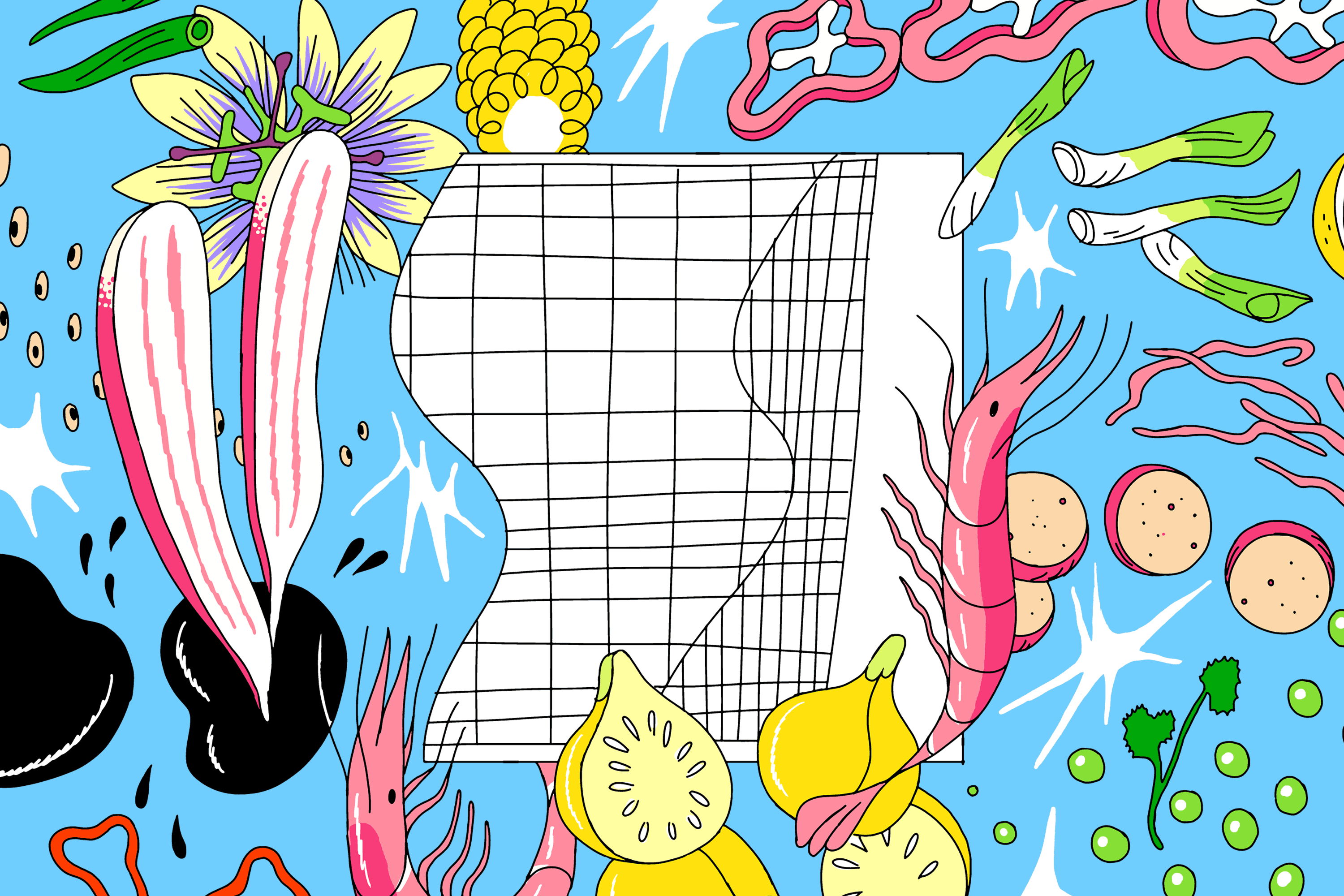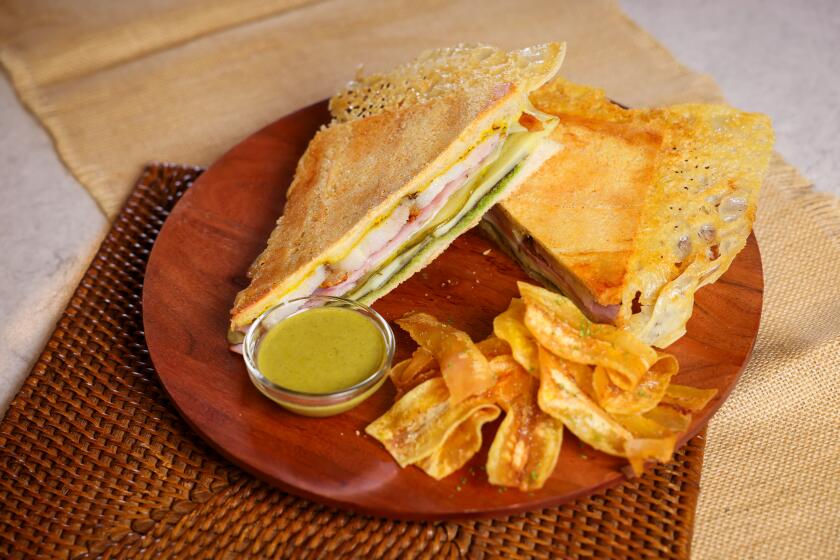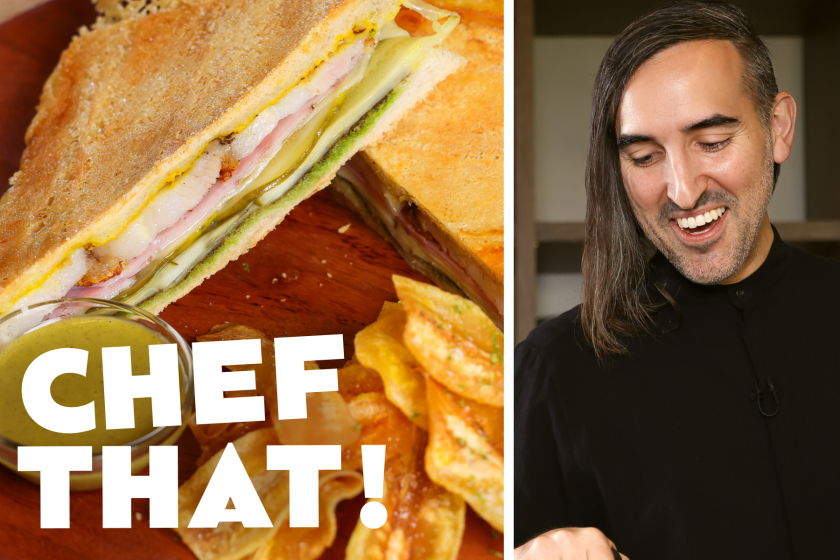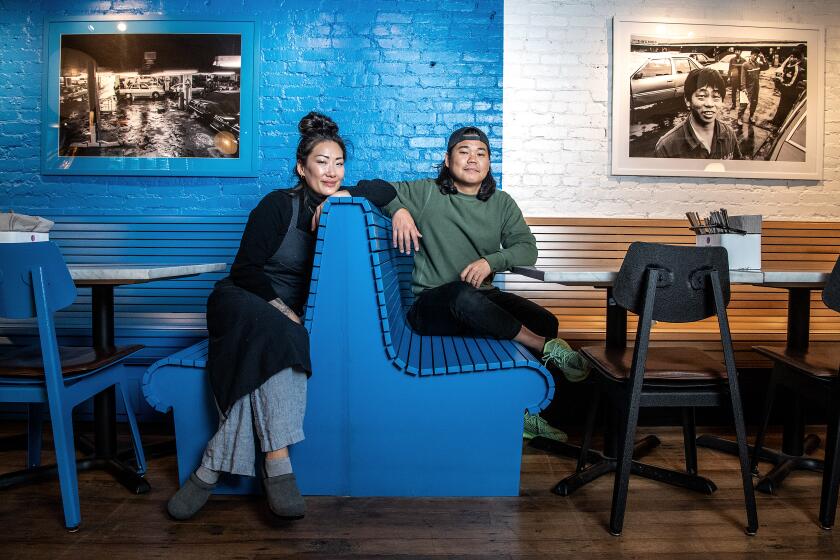
- Share via
Few Los Angeles restaurateurs have had a more successful 2024 than Jordan Kahn.
After years of closure, the chef’s groundbreaking fine-dining restaurant Vespertine reopened in the spring, with a new menu, a refreshed dining room and reinvigorated staff.
This summer the erstwhile L.A. Times best restaurant regained its two Michelin stars and was the only new restaurant in the state to earn a green star for sustainable practices. His restaurant Meteora also earned its first Michelin star.
Kahn executes some of the city’s most elaborate tasting menus and conceptualizes a meal’s experience down to the custom fragrance or timed soundtrack.
“Kahn is playing with modes of dining that have never before been articulated,” L.A. Times Food critic Jonathan Gold once wrote. “Months after your meal, images and juxtapositions will flash through your thoughts, as vivid as they were the evening of your dinner.”
Vespertine, Jordan Kahn and the need for creativity in the face of a pandemic
Now the chef, who also operates Destroyer in Culver City, hopes that the return of his most ambitious project could signal success for other chefs as well.
“A lot of my colleagues are very excited that we’re reopening because it represents something for them, a kind of hopeful future for sort of the genre of gastronomy not slipping into an abyss of one thing or another,” he said. “Because we’re obviously unique, it makes it known that uniqueness can still prevail through all the mud that we’ve had to go through.”
The Vespertine experience starts in the garden of a Hayden Tract building designed by architect Eric Owen Moss, where guests are served sparkling birch juice. Inside, they are surrounded by art installations and meticulously crafted soundscapes.
Kahn, a former musician, takes his restaurants’ soundtrack seriously. The music played in the first iteration was custom-created by band This Will Destroy You; this time around the chef tapped new musician-friends, including a member of Sigur Rós, and also helped to compose.
The rooftop has been reconfigured, as has the dining room. Meals are cooked using a charcoal grill, induction burners and other tech — such as dehydrators slowly drawing the moisture from cinnamon, seaweed and more. A new tea service, offered in a new lounge, acts as a sort of intermission between dinner and dessert.
Also among Vespertine’s new facets is a more collaborative focus with other artists and makers. Dishes are made by artists Mitch Iburg and Zoë Powell, who harvest wild clay. New vessels from other makers might take the form of coral sustainably harvested off the coast of Miami, or Taiwanese pottery, or a jet-black piece by a family of 12th-generation obsidian artists located just outside Mexico City.
“The first iteration was, for me, very moving: I was connecting the space and the food and the environment and materials and everything into this very cohesive, singular sort of expression,” Kahn said. “I think the newer iteration feels more evolved. It’s me I guess seven years later, and I’ve since found the love of my life, so that made a big impact on everything.”

Zara Ziyaee Kahn heads up communications for the chef’s three restaurants but more informally serves as his sounding board and guiding star. When the pandemic hit, it was her voice that helped lead Kahn — and Vespertine — through it, translating the restaurant to a more accessible menu via pop-ups and themed home meals.
“We had our last service on Sunday, we were shut down on Monday, I cried like a baby on Tuesday,” Kahn said. “She told me to get my s— together and get back to it, basically. … She said, ‘It doesn’t have to be Vespertine. Takeout just needs to be you. Everybody only knows you as the guy that makes the food in the tower. Tell them a little bit more about who you really are.’”
He cooked his grandmother’s Cuban sandwiches on panini presses fashioned from flat-top griddles with hinges drilled into them, and the line stretched down the block. He designed a Sicilian menu as an ode to his other grandmother. He revisited his own past with homage menus to his years at Red Medicine and the French Laundry.

Jordan Kahn of Vespertine, Meteora and Destroyer turns crisp-skinned pork belly into a cheesy Cubano sandwich with Gruyère, pickles and mustard.
Chef Jordan Kahn of Vespertine, Meteora and Destroyer makes Cubano sandwiches with crispy-skin pork belly, mojo rub, pickles, mustard and Swiss cheese.
He estimates that Vespertine served more guests in two months of takeout than it had in three years of dine-in service. These changes, the fluidity and the new connections, he said, forced him to grow as a chef — which led to 2024’s Vespertine.
“I just feel more like myself, getting in touch with some of those more earlier versions of myself and all these sorts of life experiences and the people who’ve made me who I am today,” Kahn said.
Kahn also has had to contend with his leadership.
A 2022 Eater L.A. article reported that the chef’s striving to push boundaries in the world of fine dining caused mental and physical stress to several employees who “suffered for Kahn’s artistic expression.” Kahn maintains that the Eater report was “filled with inaccuracies,” but of the instances and recollections he believes were accurate, said that they were rectified “long before” the article was written.
“We put so much effort and energy into what we do,” he said, “so to learn that there were people that didn’t have positive experiences was very, very upsetting.”
Since the article, he said he has become much more active not only in all facets of operations but in the day-to-day well-being of the staff.
“The best experience possible relies on a focus on staff,” he said. “It happens downstream. If the staff’s experience is healthy and positive and enriching, if they’re really connecting with what we’re doing, then I kind of don’t even really need to worry about the guests’ experience. It’s sort of like it’s taken care of.”

The rise of Meteora
Wafts of burning copal trail from the entrance of Meteora, less a front door and more a portal shaped from the curves of bent sticks and boughs.
When Kahn first toured the echoing, minimalist Melrose Avenue space dotted with skylights, the building reminded him of cenotes, water-filled caves with openings often shrouded in greenery and vines. He hand-molded curving shelves and cubbies and added 700 plants to the multiple dining rooms.
“The space has just an enormous amount of life to it,” Kahn said. “It’s like a 2,000-year-old version of [Vespertine],” an ancient precursor to the Culver City destination. Live-fire cooking and whole ingredients are meant to evoke a more primitive time — but set in a modern era: Beef tartare is scooped with fragrant cinnamon sticks in lieu of utensils, sugars are unrefined, grains are ground in-house.
Meteora and its culinary direction helped one of its lead chefs renew his love of fine dining.
When Ki Kim closed Kinn, his modern Koreatown restaurant, last winter, citing mental health struggles, he couldn’t imagine holding a position of authority in a professional kitchen ever again. He said he felt “left with nobody and nothing,” listless and depressed.
But Kim had dined at Meteora last year and said it was the best dining experience he’d ever had in L.A. After closing Kinn, he emailed the chef directly and interviewed, eventually becoming Meteora’s chef de cuisine.
“Meteora has kind of been an opportunity for me to gain trust in humanity again,” he said. Kim calls Kahn “a mastermind” who sees culinary details and angles that he wouldn’t naturally notice.
Kahn’s attention to detail is ambitious, especially when it comes to sourcing: a factor in Vespertine’s green-star accolade awarded by Michelin this summer.
“We work with these extraordinary people,” Kahn said, “but now we’re gonna share this in a way that’s less of a dissertation and more like, ‘Here’s a series of stories that all come together.’”
He said he wants all of his restaurants to shed more light on the makers and farmers behind the dishes.
Welcome to the jungle
The plan for Kahn’s installation at L.A. Times Food Bowl is simple: Transport guests from one of the city’s most famous movie backlots into the Amazon and along the banks of the Rio Acara.
Whereas Vespertine is heavily reliant on its custom otherwordly architecture, Meteora is a bit more about connecting to nature — and Kahn wanted to bring the natural world into his tasting room at this year’s Food Bowl complete with specially formulated scents, recorded sounds of the rainforest and an immersive installation devoted entirely to raw cacao harvested wild and processed by one of Brazil’s artisanal purveyors, Luisa Abram.
“It’s so easy for us in America to go to a grocery store and there’s just a million chocolates on the shelf,” Kahn said. “There isn’t a story or history or connection to it. This becomes a bit more of an immersive component, where it helps to connect people.”
When he called the chocolate maker and finished explaining his intentions and plans, what followed were two minutes of silence, then tears. The concept was so moving that Abram and her team decided they’ll also attend, flying from Brazil — and will be there to meet VIP attendees and share what they do.
Kahn spotlights Abram’s chocolate in sweet and savory ways, such as in a paste that covers hearth-roasted beets served alongside lamb, or blending it down into an almost pudding-like ganache and burying it under a mound of coconut-and-cucumber powder.
Jordan Kahn of Vespertine, Meteora and Destroyer turns crisp-skinned pork belly into a cheesy Cubano sandwich with Gruyère, pickles and mustard.

“I’d been a pastry chef my whole career and we’d always told ourselves that the best chocolate in the world came from Europe, but the cacao came from South America,” Kahn said. “Once you start tasting Luisa’s chocolate you start tasting the region more in a profound way. [Cacao pods are] fermented there with the native yeasts, so it produces very different flavors.”
For the installation, a path leads to several stops, each corresponding to a step in the life cycle of wild cacao. The shape of Kahn’s path is a replica of the Rio Acara, one of the main rivers along which cacao is harvested; heaters will be cranked and humidifiers misting to re-create a journey through the Amazon, while Kahn pumps a custom fragrance through diffusers to emulate the scents of the forest.
At Food Bowl the journey begins with an introduction to cacao in its rawest form, a large, thick pod of tropical fruit that hangs from tree branches. As guests continue they’ll encounter a display on harvesting — the weeks spent foraging — and eventually a third display, on fermentation, or the process where the cacao develops much of its acidity and layers of fruit notes. The final presentation will focus on roasting, which Abram and her team oversee in Sao Pãulo.
It all culminates in a savory bite, a sweet treat and a cocktail, all of which feature Abram’s chocolate. Guests also will receive some of Abram’s chocolate to take home, but Kahn hopes the experience will have much more longevity than the product.
“If I’m featuring something on the Meteora menu or the Vespertine menu, it’s about ingredient purity, like, ‘This echoes into parts of your soul,’” Kahn said. “It’s not about taste. It has more depth than that.”
More to Read
Eat your way across L.A.
Get our weekly Tasting Notes newsletter for reviews, news and more.
You may occasionally receive promotional content from the Los Angeles Times.














